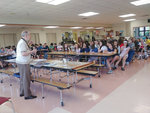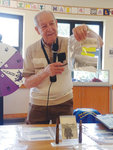By JEN COWART It was the end of the school year, classes were coming to a close, and the students at Hope Highlands Middle School were gathered together in the cafeteria. Their eyes and ears were fixed on Domenic Giarrusso, a 96-year-old World War II
This item is available in full to subscribers.
We have recently launched a new and improved website. To continue reading, you will need to either log into your subscriber account, or purchase a new subscription.
If you are a current print subscriber, you can set up a free website account by clicking here.
Otherwise, click here to view your options for subscribing.
Please log in to continue |
|


It was the end of the school year, classes were coming to a close, and the students at Hope Highlands Middle School were gathered together in the cafeteria.
Their eyes and ears were fixed on Domenic Giarrusso, a 96-year-old World War II veteran who had come share his experiences and wisdom with the youngsters.
The 75th anniversary of D-Day had just passed days before, and the students listened to Giarrusso describe his service in the Pacific Theater during the war.
“We have to be thankful for Mr. Giarrusso and millions of other men and women who served for us, worked, represented and fought for us. Many of them are no longer with us,” social studies teacher Edward Inman told the students.
Giarrusso told the students about life during his youth in the 1930s and 1940s.
“There were no iPhones, no cell phones. The best you could hope for was a four-party line telephone, if you were lucky,” he said.
He then described the Pearl Harbor attack, which stunned Americans and inspired millions of men like him to enlist in the military. At the time, he was not quite 18 years old and not finished with high school.
“We were not prepared for war,” he said. “They had us turn all our lights off and close all the curtains in our homes – no lights could shine on the streets. There was shore patrol and there were neighborhood patrols to make sure no one infiltrated.”
He added: “I had to get my mother and father’s permission to enlist, and my dad signed the papers. I went downtown, foolishly thinking that I would get the physical, sign the papers, enlist and go home. But, they wouldn’t let me go home, and off to Fort Devens [in Massachusetts] I go. I was scared, unsure about what would take place. There were strange men from all over New England there. We all had to take an aptitude test and we were separated by ability.”
Since Giarrusso had worked as an auto mechanic, he wanted to be an airplane mechanic. He qualified for that role and began his basic training.
“You learn things like how to take orders, how to march in formation, rifle range shooting, and how to take a gun apart and put it back together again, blindfolded,” he said.
From Fort Devens, Giarrusso went to Miami Beach and to St. Louis University, where he took engineering maintenance courses.
“I completed two years’ worth of engineering studies in 32 weeks, taking classes from 8 a.m. to 5 p.m. with an hour for lunch, and we had to still drill for an hour,” he said. “Then we would have our meal and then after that we were free.”
Giarrusso’s service took him to Egypt, Italy and Africa. He described traveling overseas with 3,000 other men on a boat that had formerly been a cruise ship.
“The swimming pool became a bathroom,” he said. “The first night we were overseas in Africa, the Germans knew we’d landed and they fired over our heads. We had to use our helmets as shovels to dig holes into the ground to hide in.”
He described the intense heat at times, and the lack of housing and supplies.
“We laid on the ground and slept in half a shelter. You owned half the tent and the other fella owned half the tent,” he said. “In Egypt, we moved to a bigger base. One night, a fella lit a cigarette and a bullet went right by because the Germans saw the light from the cigarette. That’s when you quit smoking.”
Italy was where Giarrusso had his first real living quarters, with tents holding six men, and supplies began to arrive.
He described the war effort back home and cited the efforts of the women who worked to make supplies for the war. He held up a picture of Rosie the Riveter.
“I was not in actual combat … Our job was to put airplanes into the sky,” he said. “I volunteered for one of the early missions over Romania on a plane. Only 37 percent of the men came back, the rest were shot down.”
When asked by the students which particular life lessons were learned through his time in the war, Giarrusso was direct.
“Don’t be such a smart mouth. Learn to take orders from your superiors. Even if it seems stupid, there is a reason behind it,” he said. “Be respectful and do what you’re told.”
He spoke of a time when he was assigned the chore of cleaning the bathroom in his living quarters. The supervisor who did the inspection found a single hair in the sink, and Giarrusso was punished by having to clean all of the fire stairs in the building after marching all day on the field.
“I was given a brush to clean with, and halfway through, it wore out, so I used my undershirt to finish the job,” he said. “At the final inspection, I was one undershirt short and I had to pay for that shirt before I was given a replacement.”
When asked how he felt when the war was over, Giarrusso described mixed feelings of excitement and uncertainty.
“I felt relieved, but almost like a letdown,” he said. “I was working every day, day in and day out, climbing on planes. Now what? It’s always the unknown that both excites us and scares us.”
Giarrusso was asked what made him enlist in the military when he had not been drafted.
“I felt that this is my country and it’s the best country in the world … At the time, our military was for show and not strong. I had to save my country for myself and for the future,” he said.
Giarrusso spoke of the differences between when he enlisted and when he returned and the difficulty in acclimating back into civilian life.
“In the military, you woke up to a whistle … all the time you were up and ready, you ate breakfast and lunch in shifts,” he said. “At home, there was no one to tell you where to go, what to do, and I had to pick up and make a life all over again. I went back to working on automobiles.”
He showed his honorable discharge papers to the students.
“This was very special to me. It was now part of my resume,” he said.
As Giarrusso closed his presentation, and before the students walked through his collection of war memorabilia, he was asked to cite the hardest part of his time in the war.
“Everything is hard, because you have got to do what you are told,” he said. “I can’t express that enough … But missing my family, that was the hardest part.”
Comments
No comments on this item Please log in to comment by clicking here